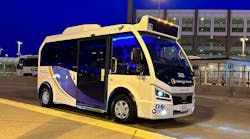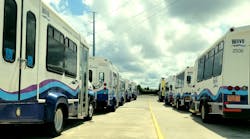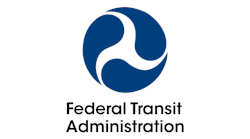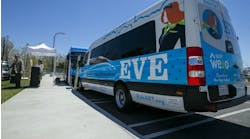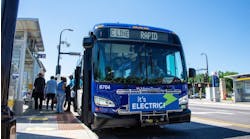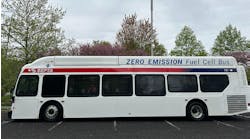On Aug. 11, a consortium of 10 smaller transit providers, led by the Heart of Iowa Regional Transit Agency (HIRTA), filed a temporary Buy America waiver for a low floor, 20-foot, zero-emission minibus with the Federal Transit Administration (FTA).
If granted, the temporary waiver would provide a new option for fleet renewal among the group of agencies that have experienced a limited procurement landscape complicated by supply chain issues and rising costs. A successful waiver could also provide a roadmap for peer agencies who are facing similar issues.
The vehicle procurement challenges rural, small city, paratransit and nonemergency medical transportation providers in the U.S. have experienced during the past 18 months have reached a dire stage. The increased costs and long lead times mean transit vehicles that were meant to have a useful life of between five and seven years are now operating between 12 and 14 years. Funds that should be put toward operations are being used to maintain aging fleets.
A Community Transportation Association of America (CTAA) survey conducted in August 2022 found smaller transportation providers saw price increases between 30 and 70 percent, growing wait times and order cancellations with 80 percent of survey respondents reporting they felt “highly concerned with the state of standard vehicle replacements.”
In a letter to support the waiver application, CTAA, The Bus Coalition, Iowa Public Transit Association and Washington State Transit Association wrote, “Today, the demand for small buses (particularly body-on-chassis vehicles) far outstrips supply with estimates of 20,000 small bus purchases currently backlogged. That number is expected to grow to 26,625 in 2025.”
Julia Castillo, executive director of HIRTA, explained pre-pandemic, the agency would expect to pay around $100,000 for a cutaway bus that would be delivered in approximately four months. Now, the cost has increased 75 percent and the delivery time is between 24 to 36 months.
“We’re not talking months anymore, we’re really talking years,” said Castillo. “Iowa has the second oldest fleet of small vehicles in the United States and if we didn’t do something, this was not going to be beneficial or safe for the people we serve or for our staff.”
HIRTA Business Manager Brooke Ramsey explained HIRTA’s fleet was undergoing a right sizing post-pandemic but the process was made more difficult with vehicle supply issues. She noted HIRTA placed an order for Ford Transits in January 2022 and, as of press time, the earliest delivery date for those vehicles would be the end of the current calendar year.
“Even with trying to downsize the fleet, we aren't solving the crisis with procuring vehicles. Pre-pandemic, HIRTA’s fleet was 60 percent past the federal useful life. Today, it’s sitting at 86 percent and we’re not alone. This is a dire situation for us, and it will become a pull-out issue where we can’t pull vehicles out to deliver service,” explained Ramsey.
In parallel with the development of the small vehicle procurement crisis, HIRTA had been part of a successful Iowa Department of Transportation application for a grant through the FTA Low- or No-Emission Grant Program. The HIRTA team found cutaway buses with an electric component would cost approximately $300,000 and have the same useful life as a non-electric cutaway.
“Brooke and I started to look at what else was available to us and that’s when Brooke saw the eJEST at a conference,” said Castillo.
The eJEST is a 20-foot, accessible, electric minibus manufactured by Turkish company Karsan Automotive and distributed in North America by Damera Bus Sales Canada Corp. The company has developed a phased approach to bring the eJEST into compliance with the Buy America requirements. The vehicle is in use with Saint John Transit in Saint John, New Brunswick and Oakville Transit in Oakville, Ontario, and has garnered interest from several U.S. transit agencies, including HIRTA.
“It’s a purpose-built bus and it has a 12-year useful life, but it didn’t meet Buy America,” said Castillo. “We believe in Buy America, but we can’t really do it now because it will take two to three years, which is not conducive to what we need, so, we asked ‘how can we do something different?’”
Developing new expertise
Something different meant pursuing into two mechanisms of the transit industry HIRTA had no previous experience in: Writing its own Request for Proposals (RFP) and applying for the FTA waiver.
Ramsey explains several peer agencies found themselves in the same situation as HIRTA where they could not find a solution to their vehicle procurement issues and smaller agencies didn’t have the staff to find individual solutions, which led to the forming of the consortium and the development of an RFP for a right-sized vehicle that could be delivered in 12 months.
“HIRTA has been around since 1981 and we had never done our own vehicle procurement. We had relied on our state to do those for us but this is a time when we needed something different, and we just decided to undertake that process to become the lead agency on the RFP. We went into it with the other transit systems really trying to solve the problem,” said Ramsey.
Another step to solving the problem was applying for the temporary waiver. Ramsey, who describes her writing style as short and succinct, explained the waiver needed to contain detailed information to ensure nothing was left out.
“I try not to make things longer than they need to be, but we needed to use all the words for the waiver because we wanted to make sure we didn’t miss anything,” said Ramsey.
In brief, FTA has three criteria to potentially qualify for a Buy America waiver, including if the application of Buy America is inconsistent with the public interest; the steel, iron and goods produced in the U.S. are not produced in a sufficient or reasonably available amount and if the inclusion of domestic material would increase the cost of the project by more than 25 percent for rolling stock.
Ramsey and Castillo explain the consortium’s waiver request meets all three criteria. Ramsey said vehicles are not available for delivery, which takes care of the second criterion, and HIRTA determined the price of the project would increase 30 percent by using domestic products, which exceeds the 25 percent threshold. When describing the reasons for meeting the “inconsistent with public interest” component, Ramsey did not sugarcoat the potential predicament HIRTA and other small agencies could face.
“If we can’t get vehicles delivered, at some point, there will be a service disruption because of a long repair or we can’t get parts and then we’re going to have to decide who we can’t take,” said Ramsey. “Is it the cancer patient? Someone who needs dialysis? A group of people going to work or school children who can’t get to school? We provide rural transportation. There isn’t another option for people.”
Partners in finding a solution
With the waiver submitted, the consortium and its supporters wait to see if their efforts are successful. Throughout both the RFP writing process and waiver application process, both Castillo and Ramsey recognize the efforts of their partners in carrying both endeavors through.
“We didn’t do this alone. We brought in partners we knew would be helpful,” said Castillo.
The group worked with local elected officials, received support from the FTA Region 7 office, support from various transit associations and brought in a consultant to share expertise for the RFP.
“We hope in this temporary situation; that the vehicle that was selected through our RFP will become Buy America compliant. In the meantime, we have an emergency that we need to solve,” said Ramsey. “This isn't just an Iowa issue. This is a national issue that we need to have some type of resolution for and, hopefully, we've done that.”


